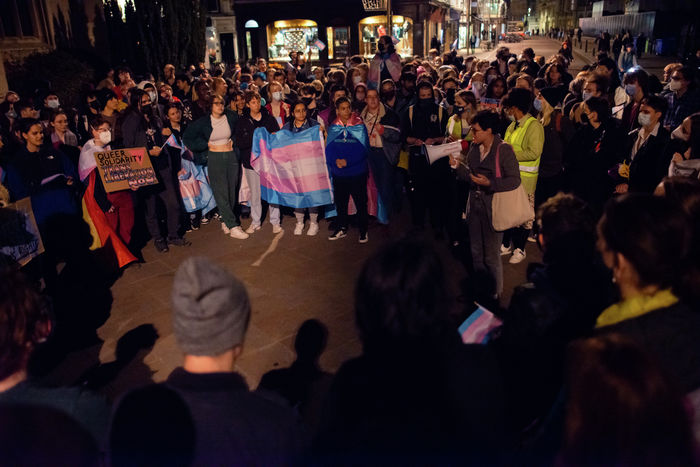This house believes not everything is up for debate
Cambridge’s eagerness to over-intellectualise sensitive issues is unproductive and uncompassionate

I’ve got a question for Cambridge this Lent term: must everything be debated?
Before the hordes of Arif Ahmed stans and free speech warriors break down my door, let me elaborate. Throughout Michaelmas, I observed a slightly annoying, but mainly concerning, tendency by Cambridge students and faculty alike to turn every topic into an argument. From the eternal discourse on which subject is the easiest all the way to the actual rights of minorities, no "issue" is safe from the fate of being picked apart and ruthlessly intellectualised until all substance and ties to reality have been lost for good.
“The Cambridge brand of argument desperately needs to make room for a bit of compassion”
This tendency to overintellectualise may be the natural product of a university environment where young minds are growing and evolving. By no means am I criticising such an environment, nor the great potential for self-development which challenging conversation breeds. But the problem here is a distinctively Cambridge one. Embodied by the uniquely chaotic nature of the Union last term, debate here has become unproductive, unfeeling and ultimately disconnected from reality. Its main purpose is no longer to expose or educate, but merely to affirm the existing positions of one side or the other while flexing the big, big brains of all those involved. The Cambridge brand of argument desperately needs to give introspection a try, making room for a bit of compassion.
As a ravenous little fresher, desperate to assimilate into Cambridge but terrified at the prospect, I joined the Union. My college subsidised the membership fee, and I was all for having my worldview challenged—something I thought the Union might offer. While I initially found myself in awe of the reputation of its speakers, I now feel as though my opinions have only been reinforced by debates which frequently descended into jeering rightwing talking points. I don’t know whether my worldview was expanded so much as it was hardened. Last term, a controversial debate on reparations left many – myself included—shocked by the racist undertones of several speeches.
Disagree with this Comment piece?
Write for Varsity and have your say. Just email our Comment team with a 100-word pitch.
Under the unforgiving lights of the chamber, I was struck by the feeling that we had lost any sense of why we were debating in the first place; it had quickly devolved into a narcissistic race to the bottom. The real individuals with their livelihoods at stake had been eclipsed by callous attempts at entertainment. Calvin Robinson, an opposition speaker who—to put it mildly—caused a stir with his defence of British imperialism, went on to criticise students for expressing visceral reactions to his arguments, as though they should be ashamed for their aversion to his harmful ranting. I hope I speak for all students when I say that empathy is never shameful.
As I considered never coming back to the Union, a friend made a comment that struck me as revealing of the toxic relationship between Cambridge and making everything an intellectual issue. Despite having only the best of intentions, they remarked that it was my “duty” to see debates like these through, as if my non-attendance neglected some great moral responsibility. Would I be banished by the divine gods of rhetoric and reason for my sins?
My friend’s comment struck me as tone-deaf, particularly as it was regarding an event that was borderline traumatising for many students of an ethnic minority background. There is a propensity here to act as if everything is and should be up for debate, but I think we also have to acknowledge that such a mindset comes from a place of privilege.
At Cambridge, conversations about privilege are met with about as much enthusiasm as a 7AM fire drill, but I think it is gravely important that we have them. It is far easier for students from more privileged backgrounds to want to debate rights when their identity isn’t up for grabs on the platter of discourse. It is dangerous to forget that real people are at the heart of our words, especially when it comes to politics.
Identifying when something does not need to be divorced from its original subject and made unnecessarily intellectual is a skill that a few of us need to get better at—a skill that would probably make Cambridge students a bit more likeable too.
It’s completely okay to want to draw the line somewhere. Approaching debate with sensitivity, both within the Union and without, is not an affront to the academic, no matter how much some fellows here suggest otherwise. Almost all of our interactions, whether during Cambridge or beyond, would undoubtedly improve if we spent less time stroking our own academic egos and a little more time trying to live in someone else’s shoes. Not every discussion needs a "devil’s advocate", I promise.
 News / Uni Scout and Guide Club affirms trans inclusion 12 December 2025
News / Uni Scout and Guide Club affirms trans inclusion 12 December 2025 News / Pembroke to convert listed office building into accom9 December 2025
News / Pembroke to convert listed office building into accom9 December 2025 Features / Searching for community in queer Cambridge10 December 2025
Features / Searching for community in queer Cambridge10 December 2025 News / Uni redundancy consultation ‘falls short of legal duties’, unions say6 December 2025
News / Uni redundancy consultation ‘falls short of legal duties’, unions say6 December 2025 News / Gov declares £31m bus investment for Cambridge8 December 2025
News / Gov declares £31m bus investment for Cambridge8 December 2025









